Iran Forcing Students To Rally Against Israel
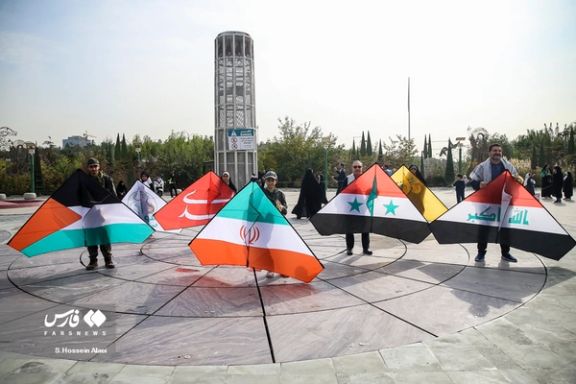
The hardline Fars News Agency, affiliated with IRGC, has reported that an anti-Israel call is being made across schools in Iran amid the Hamas-Israel war.

The hardline Fars News Agency, affiliated with IRGC, has reported that an anti-Israel call is being made across schools in Iran amid the Hamas-Israel war.
Fras wrote that this ceremony would take place on Saturday with cultural programs, music performances and expression of opposition to “hostile policies” of the United States and Israel as well as the conflict in Gaza.
Students and the public will be chanting Islamic nationalist slogans and songs regarding "a new global order with an ideal generation,” Fars said.
Meanwhile images on social media show students singing a different tune. Iranians have been showing strong opposition to the government's pro-Hamas and anti-Israeli narratives as well as unusually vocal support for Israel in its war with Hamas.
“Neither Gaza, nor Lebanon, I will sacrifice my life for Iran,” has been a popular slogan that has been chanted by student in schools, which contradicts the report by Fars news, one of the main media outlets of Iran’s Revolutionary Guards.
The Iranian regime has a history of using schools and rallies to further its agenda and narrative with regards to the conflict in the Middle East.
Numerous instances of Iranians expressing support for Israel have emerged on social media including during a football match between Esteghlal and Havadar teams back in October.
Podcaster Sadegh Rohani pointed out in a tweet: "Israel has never been as popular in Iran as it is now. Even if there were Israel supporters before, they were not as outspoken as they are today.”
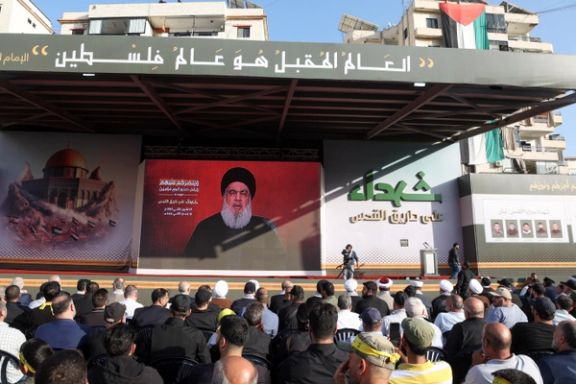
Hezbollah's leader, who has refrained from getting fully involved in the Hamas-Israel war so far, said Friday that the battle has spread to other fronts.
Hassan Nasrallah broke his month-long silence on its Palestinian ally’s war with Israel in a long-advertised televised speech on Friday, thanked "Iraqi and Yemeni hands" that have joined the battle. Houthis in Yemen have launched drone and missile against Israel that have so far failed to hit a target. Pro-Iran Iraqi militias have launched nearly 30 attacks against US forces in Syria and Iraq.
Hezbollah supporters also held gatherings in Beirut, where Lebanese watched Nasrallah's first public address since Hamas went to war with Israel. In Tehran, the regime installed large screens at a main square to broadcast the speech live. Supporters of Iraqi Shiite armed groups also gathered in Baghdad's Tahrir Square to watch the speech.
Nasrallah added that the decision to launch the October 7 attack on Israel by Hamas was 100-percent a Palestinian decision.
Iran and Hezbollah have been accused of full involvement in the planning of the attack, with several public and secret joint meetings having been held since April in Beirut and Damascus.
"We are ready for all possibilities," Nasrallah said.

Al-Aqsa Flood battle has extended to more than one front, he said, adding, “We thank the Iraqi, Yemeni hands that joined this battle." However, he claimed that the decision for the attack was made by the Palestinian group and no other group of the resistance front – the term for Iran’s proxy militia – was aware of the operation.
Hezbollah have been escalating day by day, forcing Israel to keep its forces near the Lebanese border instead of the Gaza Strip and the occupied West Bank, Nasrallah said in the televised address. "What's happening on the border might seem modest but is very important."
Defending the surprise attack, he said such a big victory makes it worth the high number of people who have been killed in Israel’s retaliatory fire because the October 7 attack changed the landscapes of the Middle Eastern conflicts. He also blamed the conflict and high Palestinian civilian death toll on the United States.
He said one of the biggest mistakes Israel is making now in its war against Hamas in Gaza is pursuing goals that it cannot achieve, referring to uprooting the Islamist group. "For a whole month, Israel could not offer a single military achievement," Nasrallah claimed, adding that Israel can only get back hostages through negotiation.
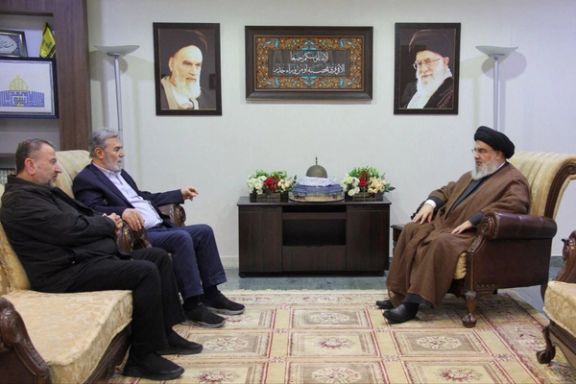
Hezbollah has been exchanging fire with Israeli forces across the border since October 7, when Hamas -- another Iran-funded militia – declared war on Israel in a multi-thronged attack terror codenamed al-Aqsa Flood (Storm in Persian) and killed over 1,400 Israelis and took over 230 hostages.
Iran has repeatedly threatened that the war will escalate to other fronts unless Israel halts its retaliatory offensive against Hamas in Gaza. In addition to sporadic clashes in the West Bank and multiple rocket and drone attacks against bases hosting US forces in Iraq and Syria, Hezbollah’s active engagement in the war can significantly change the landscape of the conflict. However, Hezbollah has not yet unleashed its large missile arsenal against Israel or tried any incursions.
According to the latest public estimates, Hezbollah has around 150,000 rockets and missiles, most with a reported range of a few dozen to hundreds of kilometers. On Thursday, The Wall Street Journal reported that Russia's Wagner mercenary group plans to provide Hezbollah with an air defense system, foreshadowing planning for a looming war.
Iran's Revolutionary Guards founded Hezbollah in 1982, in the middle of Lebanon's 1975-90 civil war. It was part of Iran's effort to export its 1979 Islamic Revolution around the region and fight Israeli forces after their 1982 invasion of Lebanon.
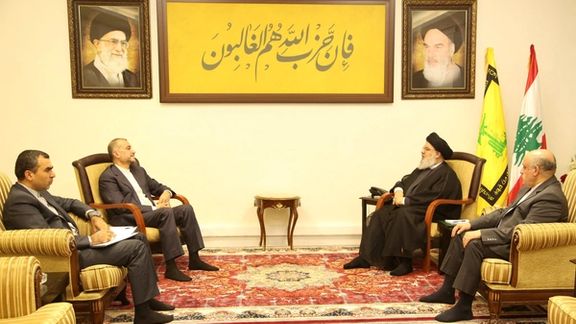
Hezbollah said Thursday that it had attacked an Israeli army position using explosive drones for the first time, prompting heavy Israeli shelling, escalating clashes at the frontier. The Israeli army said it was striking a series of Hezbollah targets in Lebanon following several launches towards Israel.
Also on Thursday, Samir Geagea, the leader of Lebanon's biggest Christian party, the Lebanese Forces, called on Hezbollah to withdraw its forces from the south of the country, stating that “dragging us into the war would be a crime."
As the conflict between Israel and Hamas reverberates across the Middle East, the risk of war between Hezbollah and Israel remains higher than at any point since their last big conflict in 2006. Reuters cited unnamed sources as saying that Hezbollah knows that Lebanon, with a struggling economy and a crumbling state, cannot afford another war between Hezbollah and Israel. "Hezbollah has no interest in war. Lebanon has no interest in war", a source familiar with Hezbollah thinking said.
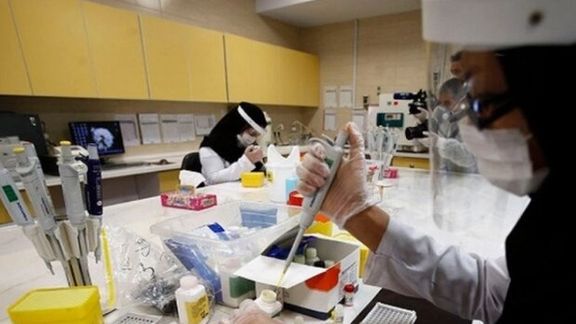
According to local reports, severe shortages of laboratory kits in Iran have led to the suspension of over 50 types of medical tests in the country.
Etemad newspaper on Friday reported that several medical diagnosis and genetic laboratories in Tehran and Esfahan have deactivated hormonal, infectious, and genetic tests in their registration systems because the required kits for performing these tests are unavailable.
The procurement of kits in Iran has been challenging in recent years, but this year the difficulty has reached a point where even buying them from the black market is not a possibility, the report says.
Over 80% of laboratory items in Iran are dependent on imports, and the equipment that is produced domestically requires its raw material to be imported as well.
The allocated foreign currency for importing laboratory equipment has experienced a sharp decrease to half of its previous amount in the past three years, according to the Etemad report.
Imports and the foreign currency market are controlled by the Iranian regime, meaning the funds that were meant for the purchase of medical tests have been spent elsewhere.
This is not the first time that medical products and equipment have become unavailable in Iran. Two years ago, there was a critical shortage of serums, and the Iranian Pharmacists Association stated that cost-cutting measures by the authorities was the leading cause of the shortages.
"We are facing both a shortage of kits and a significant increase in the prices of kits and other consumables, up to four or five times higher,” said Mohsen Manshadi, owner of the Manshadi Medical Diagnosis Laboratory in Tehran.
"Many times, my laboratory colleagues have had to repeat a test using multiple kits to arrive at the correct result or use cheaper kits,” Manshadi added.
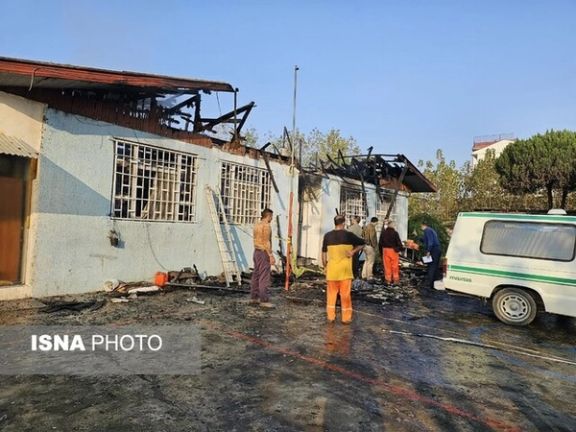
Following a fire in a drug rehabilitation camp in Gilan province in northern Iran, 32 people have been killed and 16 people have been injured, local media reported on Friday.
Preliminary investigations indicate that a heater in the opium rehab camp in Langarud in the Caspian Sea province of Gilan was the cause of the fire that spread to the rest of the area, Reuters reported.
The fire was called in to the fire department before 6 am on Friday but the exact cause is yet to be determined.
The Chief Prosecutor of Gilan announced that the camp managers and officials responsible are under investigation, referring to the transfer of the bodies of the deceased to the forensic laboratories.
The Mizan News Agency, affiliated with the judiciary, also stated that the maximum capacity of the facility is 40 people according to statistics. However, it is unclear how many people were actually living in this camp at the time of the fire.
Images of the fire reported by ISNA showed it lighting up the sky and sending huge clouds of smoke into the air around the camp.
Other pictures showed emergency staff, firefighters and ambulances gathered outside the heavily damage site after the fire was stopped. The images show that the roof of the facility has been destroyed and the windows have been broken.
In recent years, there have been numerous fires with casualties in Iran which experts say are the result of bad management by authorities and lack of funding for up-to-date infrastructure.
In January 2017, Plasco shopping center in Tehran caught fire, killing at least 22 people including 16 firefighters. The incident was a major tragedy and it highlighted major flaws in Iran’s safety standards and firefighting capabilities.
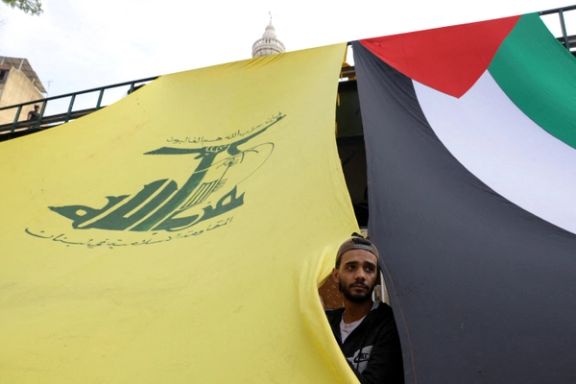
The US has intelligence that Russia's Wagner mercenary group plans to provide Iran-backed Lebanese militia Hezbollah with an air defense system.
The Wall Street Journal cited unidentified US officials as saying that Wagner plans to supply the Pantsir-S1 system, known by NATO as the SA-22, which uses anti-aircraft missiles and air-defense guns to intercept aircraft.
Wagner Group, which was funded by the Russian state and has been brought firmly under Kremlin control since an aborted mutiny by its former leader, Yevgeny Prigozhin, in June, did not reply to a request for comment from Reuters.
One unidentified US official quoted by the Journal said that Washington had not confirmed that the system had been sent. But US officials are monitoring discussions involving Wagner and Hezbollah, the Journal said.
The Journal said that the Pantsir system would be provided to Hezbollah via Syria, where Russia propped up President Bashar al-Assad by entering the civil war there in 2015.
Iran's Revolutionary Guards founded Hezbollah in 1982, in the middle of Lebanon's 1975-90 civil war. It was part of Iran's effort to export its 1979 Islamic Revolution around the region and fight Israeli forces after their 1982 invasion of Lebanon.
Lebanon's Hezbollah has been exchanging fire with Israeli forces across the border since its Palestinian ally Hamas in Gaza declared war on Israel on October 7.
(Reporting by Reuters)
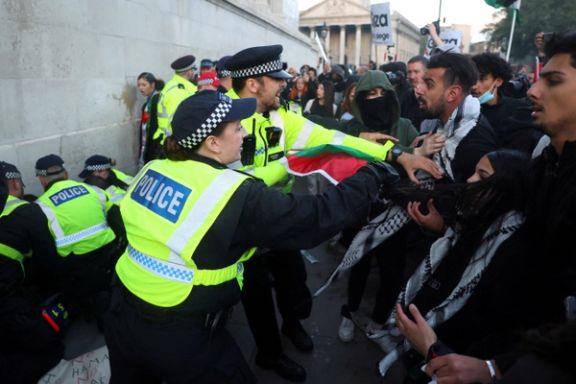
An investigation in The Times of London has revealed more than six UK-based groups with ties to the Iranian regime and active in pro-Hamas rallies.
It comes amid rising fears that the Iranian regime’s influence on UK soil is deepening, as seen in the weekly pro-Palestine / pro-Hamas protests which have been shown to be fuelled by Tehran-linked groups.
In the latest report from The Times, it claims “Whitehall briefings, informed by intelligence, suggest that Tehran has links to a core group of institutions to assert soft power, drive influence and sow tension”.
It went on to add that a “wider network comprising mosques, charities and other third sector organisations are also thought to have regime links”.
The latest revelations come amid the war between Israel and Iran-backed Hamas, which last weekend saw over 100,000 protesters on the streets of London backing Gaza.
Anti-regime activist Vahid Beheshti, was attacked at the protest, in a suspected act by IRGC agents. He was also assaulted on October 14 by activists carrying images of Khamenei and assassinated Quds Force commander, Qassem Soleimani. One man was arrested and charged for possessing a knife in public after allegedly threatening to behead him.
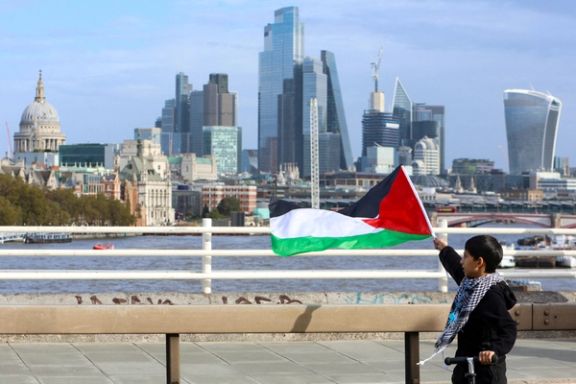
One of the organizations, The Times claims, with direct links is the Islamic Centre of England [ICE] which is at the center of an inquiry by the Charity Commission. Another is the Islamic Human Rights Commission, an advocacy group with links to Iran’s supreme council.
Leaflets at last week’s protests contained typically incendiary regime rhetoric about Israel, calling it the “usurper Zionist regime” and as a cancer that would be eradicated. Protesters were even seen holding photos of Supreme Leader, Al Khamenei who recently hailed its proxy for the atrocities on October 7 when it invaded Israel, killing 1,400 mostly civilians and taking a further 240 hostage in Gaza.
As if it were the streets of Tehran, placards could be seen with the words “the Zionist regime is dying” and others even held flags of Iran and its proxy, the Al-Hashd Al-Sha'bi militia force.
Just last month UK security chiefs continued to voice concerns about the threat posed by Iran on UK soil. Earlier this year, it was revealed that multiple attacks by the IRGC have been thwarted, including on Iran International offices which were temporarily forced to relocate to Washington.
As regime fervour continued to simmer, The Union of Islamic Student Associations in Europe, which has active branches in Britain and several other European countries, shared a clip of Khamenei’s speech spliced with footage of London protests on Telegram on Wednesday, The Times revealed.
Only in August, the group, which is said to have direct backing from Khamenei, hosted several senior IRGC figures in online talks viewed by British students, who were encouraged to fight in an “apocalyptic war” against Iran’s enemies and Jews.
This week, Khamenei gave a speech mocking the allegations that the regime had its hand in mass protests across Europe, in a speech Wednesday laughing at the idea of the public claiming “the London Basiji must be behind this, or the Paris Basiji must have done this”. Instead, he insinuated it was simply the weight of anti-Israel fever sweeping the streets of Europe.
Behesthti said the actions of recent weeks show ever more the need for the UK and others to proscribe fully Iran’s IRGC as the regime’s threats to the West become ever more feverish. His speech addressed all Muslims around the world that it is not only the "Zionist regime of Israel" that is standing against Islam, but also Britain, France and the United States.
“Khamenei is openly giving an order of Jihad to all Muslims, in order to go after the "enemies of Islam", namely Great Britain, France and the United States, according to the Supreme Leader of the Islamic Republic.
“Yet, given this, our government in the UK is still reluctant to proscribe the Islamic Revolutionary Guard Corps. This is a necessary step in order to send a strong message that the UK does not tolerate terrorism and continued threats against our national security.”
The US proscribed the IRGC in 2019 under then-President Donald Trump and while many other nations have designated members, with the sensitivity of Iran’s nuclear program, it has become a global bone of contention for countries such as the UK and Canada as to whether or not to designate the group as a whole.